#South African apartheid
Text

#palestine#free palestine#gaza#free gaza#israel#palestine news#apartheid#israel is an apartheid state#south africa#South African apartheid#end the apartheid
64 notes
·
View notes
Text
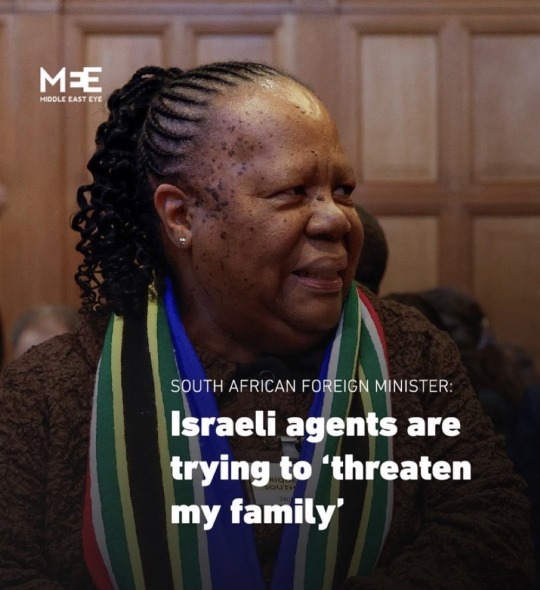
Not surprised that mossad and Israel are once again terrorising an African woman. They’re probably distraught that she’s too old to be given non consensual birth control injections. It’s an undisputed fact that Israel sees African people and countries as hut-dwelling, backroads sub- human terrorist cockroaches but we dragged their Zionist asses to the icj and won and we’ll do much fucking worse if those white demons try that shit with us. Threatening one of us is threatening all of us and making an enemy of one of us is making an enemy of all of us. We refuse to be bullied and intimidated by people who supplied weapons for the Rwandan genocide and who wanted to provide the apartheid government with nuclear fucking weapons. South Africa and Africa as a whole have been victims to white supremacy and colonialism for too long to let any people who get skin cancer at the slightest exposure to sunlight victimise us.
#free palestine#palestine#anti israel#anti idf#free gaza#south africa#gaza genocide#anti imperialism#anti colonization#anti colonialism#occupied palestine#gaza strip#gaza under attack#gaza ground invasion#naledi pandor#anti white supremacy#rwandan genocide#palestinian apartheid.#South African apartheid#jerusalem#tel aviv#mossad#anti mossad
79 notes
·
View notes
Text
How did Apartheid happen, and how did it finally end? - Thula Simpson
youtube
2 notes
·
View notes
Text
Nelson Mandela, the leader of the campaign to end South African apartheid, is released from prison by South African President F.W. De Klerk after 27 years behind bars. February 11, 1990.
Image: Nelson Mandela walks to freedom. February 11, 1990.
On this day in history, Nelson Mandela, the leader of the campaign to end South African apartheid, is released from prison by South African President…
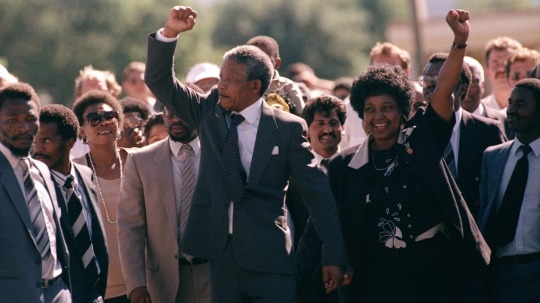
View On WordPress
0 notes
Text
Stephen Biko -- A Reblog by rawgod
Every now and then a person comes to this earth who makes a real difference in the lives of not just a few, but of many, sometimes an entire nation. Think of Martin Luther King, Nelson Mandela, Mahatma Gandhi, Marie Curie and others. One such man was Stephen Biko, a civil rights activist who literally helped change the face of South Africa. Our friend rawgod has written a post to coincide with…

View On WordPress
#Black Consciousness Movement#civil rights activism#Ideas from Outside the Boxes by rawgod#South African Apartheid#South African Students&039; Organization (SASO)
0 notes
Text
Secret South African documents reveal that Israel offered to sell nuclear warheads to the apartheid regime, providing the first official documentary evidence of the state's possession of nuclear weapons.
The "top secret" minutes of meetings between senior officials from the two countries in 1975 show that South Africa's defence minister, PW Botha, asked for the warheads and Shimon Peres, then Israel's defence minister and now its president, responded by offering them "in three sizes". The two men also signed a broad-ranging agreement governing military ties between the two countries that included a clause declaring that "the very existence of this agreement" was to remain secret.
The documents, uncovered by an American academic, Sasha Polakow-Suransky, in research for a book on the close relationship between the two countries, provide evidence that Israel has nuclear weapons despite its policy of "ambiguity" in neither confirming nor denying their existence.
. . . continues at the guardian (24th of may, 2010)
here's also a research paper published in 2004, which, looking at declassified south african documents, lays out apartheid south africa's rational for acquiring nuclear weapons (bombing, or 'deterring,' black liberation groups):
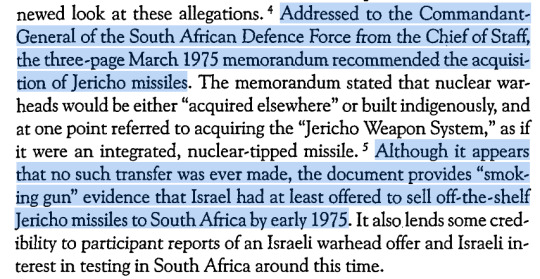
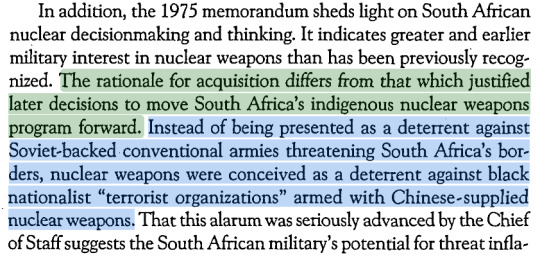
#palestine#israel#gaza#south africa#just thought i'd bring this back up with the ICJ hearings#the relationship between israel and apartheid south african was interesting to say the least#and yes israel has nukes; this is an open secret that the western world has collectively decided to turn a blind eye to
3K notes
·
View notes
Text
#South African#jerusalem#israel#South Africa#gaza#israeli apartheid#israel is an apartheid state#free palestine#palestine#فلسطين#free gaza#gaza under attack#gaza under genocide#i stand with palestine
5K notes
·
View notes
Text
SA is a nation at war with women and children
The reported crimes committed in the first quarter of the year indicate a sharp increase in the number of women and children who were raped and murdered. In the first three months of this year, 10 818 people were raped in South Africa.
Almost half of the cases took place at the home of the victim or the home of the rapist. Of the 6 083 people killed in the country, 898 of them were women, and 306 were children under the age of 17. Alarmingly, the murder of children recorded a 37.2% increase in the period of reporting.
Therefore, the declaration of gender-based violence as the second pandemic was accurate. However, unlike Covid-19, we seem to be losing the battle against this pandemic. With all the progressive legislation in South Africa, which seeks to eliminate unequal power relations between men and women, one question we must ask is why are women becoming increasingly unsafe in this country? Where does this culture emanate from, and more importantly, how do we bring it to an end?
To borrow from the words of Karl Marx – history repeats itself, first as tragedy, second as farce. It is, therefore, important to get a brief historical account of the violent masculinities engraved in the DNA of South Africa, which manifests itself through social ills such as gender-based violence and femicide (GBVF) today.
Defining GBV, the Women Empowerment and Gender Equality Act states that GBV denotes “all acts perpetrated against women, girls, men and boys based on their gender, sex or sexual orientation which cause or could cause them physical, sexual, psychological, emotional or economic harm, and includes any threat to cause harm”.
At the minimum, we agree with this definition, although in the context of South Africa, GBV is almost always perpetrated by men on women because of the unequal power relations between the two, as depicted by the staggering crime statistics.
Tracing the crisis South Africa is a very violent country. There was a perpetual normalisation of violence under apartheid, and post-apartheid South Africa has not been able to cleanse itself from this culture of violence.
As it were, this culture of violence saw white Afrikaner men embody hegemonic masculinities – something Bell Hooks defines as “White-Supremacist Capitalist Patriarchy”. To date, this behaviour continues, and it is not only prevalent among white Afrikaner men – it is a South African problem.
The tightening racial edifice of the apartheid state evolved into a political and social struggle that became increasingly defined by violent opposition. Masculinities were constructed alongside and amid these realities, creating what Penelope Andrews terms “(t)he lethal cocktail of apartheid masculinities.
Apartheid has left a legacy of violent masculinities. Apartheid emasculated black men. They were called boys, denied respect, and treated as subordinates.” The struggle of apartheid was both the struggle for freedom and, for men, it was a struggle to regain their masculinities. Men were forced to migrate for employment and work in mines. As men were forced to migrate to the mines for work, wage labour became critical, and was a crucial defining characteristic of masculinity as men increasingly became the sole provider for their families back in the reserves.
Today, as traditional expectations underpinned by this history are entrenched, the questions of strength and the extent to which one can provide for one’s family are key among men.
In the absence of these apparent manhood symbols, men seek alternative dominance through violent means. Black women, especially young black women in post-apartheid South Africa, remain the most vulnerable economically and socially, with 40.6% without jobs in the first quarter of the year. This is a crisis.
The question of what is to be done with these misplaced masculinities in post-apartheid South Africa remains and needs thorough thinking, especially among young people across party political lines, as we are the most destitute and most affected by the increasing levels of unsafety in our communities. Is there any hope for women and children in South Africa?
Our criminal justice system is failing women and children in this country. The crime statistics reported on are but a fraction of the actual levels of crime that take place on a daily basis. It is estimated that over 40% of South African women will be raped in their lifetime and that only 1 in 9 rapes are reported.
The reluctance in reporting GBV is precisely because of the low levels of conviction and the masculine nature of the police conduct, which further traumatises victims. Therefore, the first component of ending this war on the bodies of women and children is addressing the institutional challenges in our law enforcement agencies tasked to keep us safe.
We need a police service that is seen as the centre of communities instead of a police that is highly militarised, victim-blaming, perpetrator-protecting, and mostly lacks accountability. The question of what it means to serve has to be central in this regard.
At a societal level, we must admit that we will never overcome GBVF with the dominance of patriarchy, which in the South African context, is rooted in apartheid racial and class divisions.
Therefore, the mainstreaming of gender studies in all our schools from early childhood development stages is paramount. Young boys and girls must be conscientised from their earliest socialisation. We must, as society, revitalise and promote a culture of dialogue. Our legal frameworks must be supported by social action.
Government must invest in key points of intervention that will encourage behavioural change. The creation of platforms where the type of behaviour expected from men in post-apartheid South Africa is discussed is one of the questions that government should be seized with.
Lastly, and more importantly, because the South African patriarchal system is racial and capitalist in its nature, the radical socio-economic empowerment of women is now more urgent than before. This must be the foremost priority of all progressives for a future South Africa that is safe and non-sexist.
* Mhlauli writes in her personal capacity.
* * Mhlauli is the National Convener of the ANCYL and Spokesperson for the Ministry in the Presidency
#South African rape victims#South African domestic violence victims#gender based violence#Gender Equality Act#black rape victims#black domestic violence victims#apartheid#South African Apartheid#South African Patriarchal System#reporting rape#reporting domestic violence
0 notes
Photo
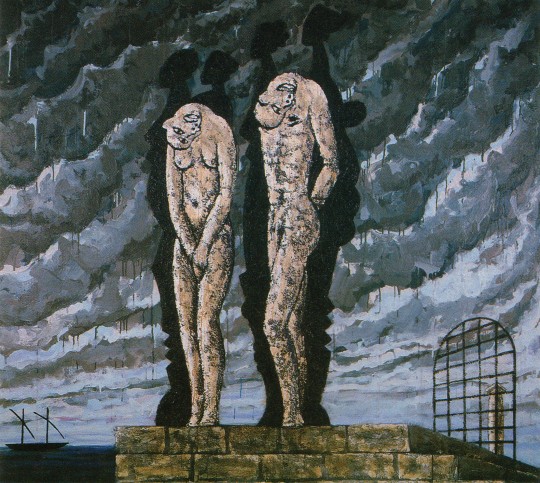
Gavin Jantjes — Untitled II (from “Korabra” series) [acrylic, sand, tissue paper and pigment on canvas, 1986]
106 notes
·
View notes
Text
On This Day In History
November 18th, 1993: South Africa approves a new constitution expanding voting rights and ending white minority rule. The first multiracial South African general elections were held in April 1994.
206 notes
·
View notes
Text
very short video about a huge issue, but the parallels between the national party and israel speak for themselves
youtube
keep up the faith, we will live to see a free palestine 🇵🇸
#youtube#palestine#free palestine#south africa#apartheid#gaza#free gaza#jerusalem#israel#african national congress
19 notes
·
View notes
Text
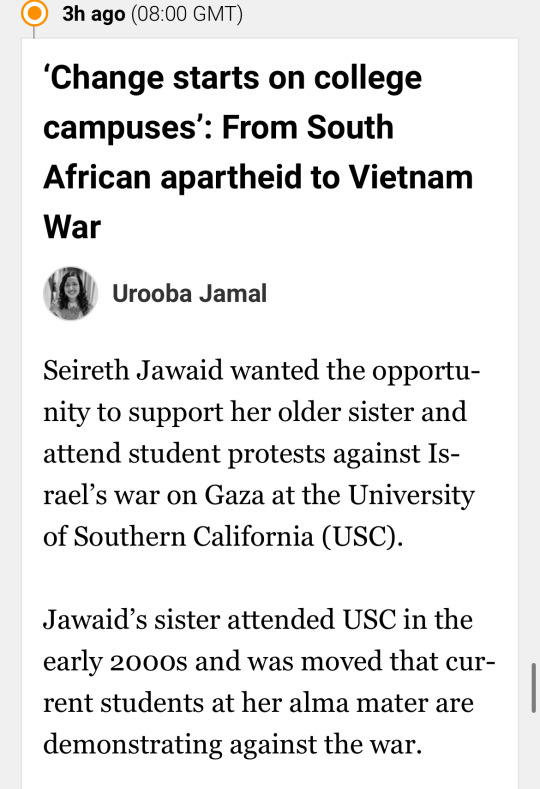


‼️🇵🇸🎓 ‘Change starts on college campuses’: From South African apartheid to Vietnam War: On campus encampments supporting Gaza
🔸 Source: Al Jazeera, with Urooba Jamal
⬇️ A video on a very similar topic
⬇️ A list of the universities that have joined the movement so far (as of 24th of April, 10:46 in GMT-6 time)
#palestine#free palestine#gaza#free gaza#israel#palestine news#info#jerusalem#tel aviv#colleges for palestine#universities for palestine#students for justice in palestine#gaza solidarity encampment#encampment#palestine protest#south african apartheid#vietnam war#palestine resistance
52 notes
·
View notes
Text
I recently saw the dumbest post I have ever seen in my entire life. What’s worse is that it was from a fellow South African (I don’t even need to tell you what their race probably was). The brainless dust mite said that comparing the genocide and apartheid in Palestine to apartheid in South Africa is disrespectful to the South Africans who actually experienced South African apartheid because it’s nowhere near the same thing.
Yes, it’s nowhere near the same thing. My parents, grandparents, aunts and uncles all lived through apartheid and their experiences were so bad (especially my dad’s family) that they have ptsd to this day.
Apartheid was a fucking tragedy and its effects are still so rampant in South Africa. But during apartheid no one was getting bombed. An entire territory was not levelled. Food and basic necessities were not completely and utterly shut out from us. Nelson Mandela was arrested barely ten minutes away from my dad’s family home. Every single person of colour, whether black, coloured or Indian in the vicinity (including my grandfather and grandmother) were taken in for questioning by a system known for torture.
As a South African, you’re a fucking spastic and I hope you experience suffering in your life <3. Also, I’d like to know how it feels to have an iq in the double digits.
#free palestine#palestine#anti israel#anti idf#free gaza#south africa#gaza genocide#anti imperialism#anti colonialism#south african apartheid#Palestinian apartheid#genocide#gaza ground invasion#gaza under attack#jerusalem#tel aviv#anti zionists#anti Zionism#war crimes
3 notes
·
View notes
Text
How did Apartheid happen, and how did it finally end? - Thula Simpson
youtube
0 notes
Photo

African Liberation Day March, Grove Lane, Handsworth Park Gate. Birmingham, UK (1979) [Vanley Burke collection, Birmingham Library]
Source: Elizabeth M. Williams - Politics of Race in Britain and South Africa: Black British Solidarity and the Anti-Apartheid Struggle (2015)
#pan-african congress#south africa#anti-apartheid#african liberation day#pan-africanism#black britain#african-caribbean
33 notes
·
View notes
Text
♫ You Can Call Me Al ♫
♫ You Can Call Me Al ♫
If you asked me yesterday about a song titled “You Can Call Me Al”, I would have looked at you as if you had two heads, would have scratched my own head, and said, “Huh?” I’ve heard the song many a time, but if I ever knew its title, I’ve long since forgotten! Tonight, it’s late (2:30 a.m.) and I’m tired after a nearly sleepless night last night, so when Paul Simon popped into my head (I swear…

View On WordPress
#Al Gore#Chevy Chase#Paul Simon#penny whistle#Ray Phiri#South African Apartheid#University of Florida basketball
0 notes